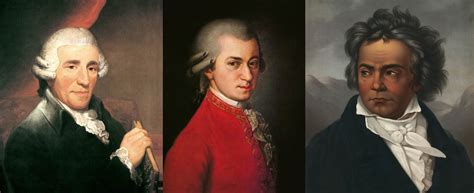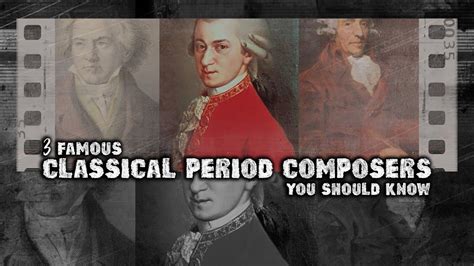Popular Classical Era Composers

The Classical Era, spanning roughly from 1750 to 1820, was a period of immense musical innovation and refinement. Characterized by clarity, balance, and elegance, this era saw the rise of composers who not only defined the style of their time but also laid the groundwork for future generations. Here, we explore some of the most influential composers of the Classical Era, their contributions, and the enduring legacy they left behind.
1. Wolfgang Amadeus Mozart (1756–1791)
Mozart is often regarded as the epitome of Classical Era genius. His compositions are celebrated for their melodic beauty, harmonic sophistication, and emotional depth. From symphonies and concertos to operas and chamber music, Mozart’s output is both vast and unparalleled.
- Key Works:
- Symphony No. 40 in G minor – A masterpiece of emotional complexity.
- The Marriage of Figaro – A groundbreaking opera that revolutionized the genre.
- Piano Concerto No. 21 in C major (Elvira Madigan) – Known for its sublime second movement.
- Symphony No. 40 in G minor – A masterpiece of emotional complexity.
Mozart’s ability to blend technical mastery with profound expressiveness remains unmatched, making him a cornerstone of Western music.
2. Ludwig van Beethoven (1770–1827)
While Beethoven is often associated with the transition to the Romantic Era, his early works are firmly rooted in the Classical style. His compositions pushed the boundaries of form and expression, setting the stage for the Romantic period.
- Key Works:
- Symphony No. 1 in C major – A nod to Haydn and Mozart, yet distinctly Beethoven.
- Piano Sonata No. 8 in C minor (Pathétique) – A dramatic and innovative piece.
- Septet in E-flat major – A charming work that showcases his early mastery of chamber music.
- Symphony No. 1 in C major – A nod to Haydn and Mozart, yet distinctly Beethoven.
"Beethoven’s early works are a bridge between the Classical and Romantic eras, embodying both the elegance of the former and the passion of the latter."
3. Joseph Haydn (1732–1809)
Known as the "Father of the Symphony" and the "Father of the String Quartet," Haydn was a pioneer in developing the structural frameworks of Classical music. His compositions are marked by wit, surprise, and a deep understanding of form.
- Key Works:
- Symphony No. 94 in G major (Surprise Symphony) – Famous for its sudden loud chord in the second movement.
- The Creation – An oratorio that showcases his mastery of choral composition.
- String Quartet Op. 20, No. 5 – A landmark in the quartet repertoire.
- Symphony No. 94 in G major (Surprise Symphony) – Famous for its sudden loud chord in the second movement.
Haydn’s innovations in form and his ability to infuse music with humor and humanity solidified his place as a giant of the Classical Era.
4. Franz Schubert (1797–1828)
Though Schubert’s career overlapped with the early Romantic Era, his early works are deeply rooted in Classical traditions. His Lieder (art songs) and chamber music are particularly celebrated for their lyricism and emotional depth.
- Key Works:
- Symphony No. 8 in B minor (Unfinished Symphony) – A hauntingly beautiful work left incomplete.
- Ave Maria – A poignant setting of a Schubert melody to a Latin text.
- Piano Quintet in A major (Trout Quintet) – A quintessential example of his chamber music.
- Symphony No. 8 in B minor (Unfinished Symphony) – A hauntingly beautiful work left incomplete.
"Schubert’s ability to convey profound emotion within Classical forms makes him a unique figure in music history."
5. Christoph Willibald Gluck (1714–1787)
Gluck is best known for his reform of opera, emphasizing dramatic truth and simplicity over ornate vocal display. His works marked a turning point in the history of opera, influencing composers like Mozart and Beethoven.
- Key Works:
- Orfeo ed Euridice – A landmark opera that exemplifies his reform ideals.
- Iphigénie en Tauride – A powerful tragedy with a focus on dramatic clarity.
- Alceste – An opera that showcases his innovative use of orchestration.
- Orfeo ed Euridice – A landmark opera that exemplifies his reform ideals.
Gluck’s reforms not only transformed opera but also set the stage for the dramatic works of later composers.
Comparative Analysis: The Titans of the Classical Era
| Composer | Key Contributions | Signature Style |
|---|---|---|
| Mozart | Operas, symphonies, concertos | Melodic brilliance, emotional depth |
| Haydn | Symphonies, string quartets | Structural innovation, wit |
| Beethoven | Symphonies, sonatas | Dramatic intensity, expansion of form |
| Schubert | Lieder, chamber music | Lyricism, emotional expressiveness |
| Gluck | Operas | Dramatic simplicity, reform ideals |

The Enduring Legacy of Classical Era Composers
The composers of the Classical Era not only defined the musical language of their time but also laid the foundation for future developments. Their emphasis on clarity, form, and emotional expression continues to inspire musicians and audiences alike. The symphonies of Haydn and Mozart, the operas of Gluck, and the early works of Beethoven remain staples of the concert hall, testaments to the enduring power of their creations.
Who is considered the greatest composer of the Classical Era?
+While subjective, Mozart is often regarded as the greatest composer of the Classical Era due to his unparalleled mastery of multiple genres and his enduring influence on music.
What defines the Classical Era in music?
+The Classical Era is characterized by clarity, balance, and elegance, with an emphasis on structured forms like the symphony, sonata, and string quartet.
How did Beethoven differ from his Classical contemporaries?
+Beethoven expanded the scope of Classical forms, infusing them with greater emotional intensity and dramatic power, paving the way for the Romantic Era.
Why is Haydn called the "Father of the Symphony"?
+Haydn is credited with developing the symphony into a mature form, establishing the standard four-movement structure and exploring innovative orchestration.
What was Gluck’s contribution to opera?
+Gluck reformed opera by prioritizing dramatic truth and simplicity, reducing the emphasis on vocal virtuosity and focusing on the integration of music and drama.
The Classical Era composers were not just creators of beautiful music; they were innovators who reshaped the artistic landscape. Their works continue to resonate, reminding us of the timeless power of melody, harmony, and form. Whether through the sublime symphonies of Mozart, the witty quartets of Haydn, or the dramatic operas of Gluck, their legacy remains an indispensable part of our cultural heritage.